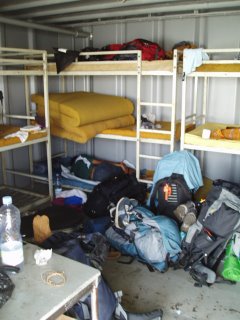I’d forgotten how much I enjoy being independent. It’s a character trait that I pride myself in back in the States because I become hyper-efficient and productive when left to my own devices. Since being in Mali, however, I’ve come to view myself as part of a larger entity, our group of 8-12 Americans that functions at a pace a bit different than mine. It has it’s advantages for sure, but I’ve realized that it can become a crutch that prevents me from exploring Mali on my own two feet. For instance, given the choice, I’ll speak English over French and Bambara any day. And I’ll forge friendships with my fellow students over breaking down the language barrier to meet Malians. Kinda sad, but true.
On Wednesday, I suddenly found myself completely alone in Mali, in the chaotic Grande Marche no less. Jamila and I had walked there from Modibo’s house when she suddenly crossed the street to head towards the bus station at Rayida. “We’ll meet up later” she called over her shoulder and I stood there slightly confused and disoriented. Is she abandoning me? Who’s going to help me bargain in the market? Shit.
And so, with some hesitancy, I began to navigate through the street vendors, trying to explain that I wanted to purchase just one meter samples of fabric for an art project. Even though I butchered every verb conjugation and tense possible, and even though I resembled a mime more than the articulate person I’d like to think I am, I felt my confidence grow after each interaction. I’d gotten my point across and that was what mattered.
Later that afternoon, after more walking and a delicious lunch at the café next to the French Cultural Center, I went to the library to begin my research on West African textiles. I hadn’t even made it through the front gate when I was approached by a Malian man, Youssouf. The conversation began with the usual, “Are you Japanese?” “No, Chinese,” I replied, “but only half.” He seemed generally interested in talking and since no warning bells were going off in my head, I continued the conversation. It ended up that he needed help translating a letter to a friend. The circumstances were highly confusing—he’s writing to the mother of a friend but she speaks Dutch and he needs to e-mail the letter in English to his friend who will then translate it into Dutch and then forward it to his mother. Or something like that. But what it came down to is that he needed me to type it on a computer because he wasn’t fast enough for the 30 minutes he could afford (125 CFA, 25 cents). I didn’t have anything pressing to do and I thought I’d make an interesting adventure, so I agreed.
I had read somewhere that good translators don’t focus on the content of what they’re saying because one, it slows them down and two, because it’s not really professional. But as I typed his e-mail as fast as I could, I couldn’t help but delve into this man’s life. Youssouf was writing to an older woman in Holland, apparently a tourist he had befriended and someone who’s become a benefactor of sorts…sending him prescription medication, clothing, mosquito repellent, and wheels of cheese (though it’s too hot for cheese right now, he explained). I learned other details of his life…that he’s a devout Muslim still fasting for the 6 days after Ramadan (not even water), that he dyes fabric as a living but is also learning English, Spanish, and German, and that he has four brother and four sisters living outside of Bamako.
I’ve always noticed how easy it is to go through life in our own bubbles, never interacting with the stranger that sits next to us on the bus. Why is that? What are we afraid of? Aren’t we all just sitting there, longing for some connection with another human being? I’m not going to say that this meeting with Youssouf profoundly changed my life, but it was an example of what you can learn when you let down your guard and take a small risk. Plus, he helped me find the right bus so that I didn’t have to walk the three miles back to my homestay.
This is a theme that I’m thinking about right now for future art projects…what is it that connects us all as humans scattered over the world. Transportation and technology? Ecosystems and food chains? War, politics, and international economies? Karma? I’m realizing that the capacity for human diversity is infinitely vast, but that there is something inherent in each of us that allows for connections to exist despite our cultural differences. But I’m not sure what that something is.
































































